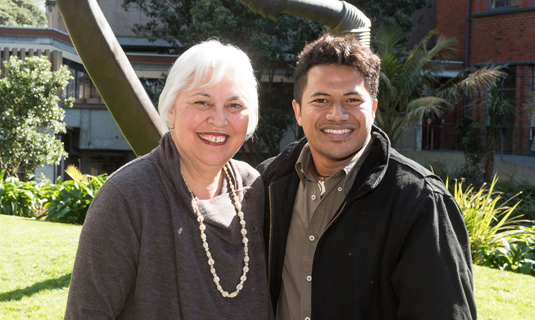Andrew Tuigamala
Andrew was impressed with Victoria University of Wellington's support for its Pasifika students, and its many student facilities.

Andrew Tuigamala is the National University of Sāmoa Student Association (NUSSA) President. He lives with his extended family in Lano, Upolu, but is originally from Sa’anapu, Upolu, Sāmoa. Andrew is in his third year of a Bachelor of Education at NUS.
Through the Office of the Assistant Vice-Chancellor (Pasifika) and in conjunction with NUS, Andrew was able to visit Victoria University of Wellington in August to learn from the University’s student-led groups, and how he could better serve his students at NUS.
Andrew was impressed with the University’s support for its Pasifika students, and its many student facilities. The large computer suites and many study spaces were a highlight for Andrew, things he said his students dreamed of having in Sāmoa.
As NUSSA President, Andrew’s role is to be an advocate for the students by expressing their requests and concerns, fundraising for resources and organising activities to help make their experience at university a good one.
Before Andrew’s tenure as President, there were very few study spaces at NUS other than the classrooms. He also explained that for a university of approximately 2,000 students, their computer labs only held approximately 150 PCs for student use. His office quickly jumped on the issue, providing four extra computers and a printer for students to print out their assignments. Andrew’s current project is to turn his NUSSA’s own offices into a study space for students.
Andrew found university halls of residence another highlight, saying that his students did not have such accommodation options. Andrew stayed at Weir House during his visit and met many of the University’s Sāmoan scholarship students who are resident there.
NUS recently benefited from a large donation of upcycled network switches from the University, to build capacity in their internet server, which Andrew said frequently crashed while students were working. Now, he said, the internet was much faster for the students, and no longer prone to crashing.
Despite facing multiple challenges, NUS has some unique features that make it a great place to study. One of these is NUS’s taupou manaia night classes where students learn about the traditional Sāmoan ceremonial dance of village chiefs’ daughters and sons. NUS also provides loan desks for students to study under coconut trees around campus. Andrew also said a key characteristic of his university is that students were generally very comfortable approaching their lecturers. Most lecturers were Sāmoan-born and raised. This helped build a familiarity between students and lecturers, and allowed lecturers to get to know their students, and better support their personal and educational development.
Although Andrew found Wellington “big, different and cold”, he would like to study at Victoria University of Wellington after graduating from NUS.
